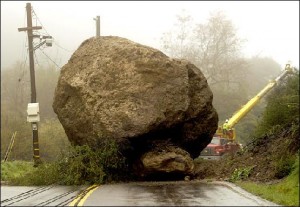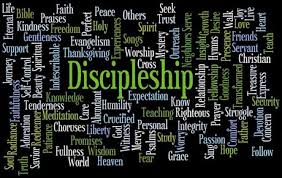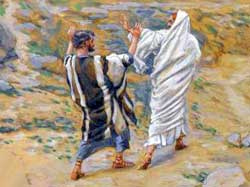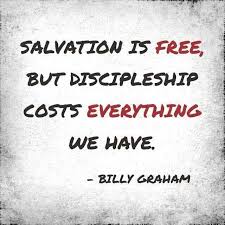
– 03-08-2023 –
Gospel Text: Matthew 16:21-27
vs.21 Jesus began to make it clear to his disciples that he was destined to go to Jerusalem and suffer grievously at the hands of the elders and chief priests and scribes, to be put to death and to be raised up on the third day.
vs.22 Then, taking him aside, Peter started to remonstrate with him. “Heaven preserve you, Lord;” he said “this must not happen to you.”
vs.23 But he turned and said to Peter, “Get behind me, Satan! You are an obstacle in my path, because the way you think is not God’s way but man’s.”
vs.24 Then Jesus said to his disciples, “If anyone wants to be a follower of mine, let him renounce himself and take up his cross and follow me.
vs.25 For anyone who wants to save his life will lose it; but anyone who loses his life for my sake will find it.
vs.26 What, then, will a man gain if he wins the whole world and ruins his life? Or what has a man to offer in exchange for his life?
vs.27 For the Son of Man is going to come in the glory of his Father with his angels, and, when he does, he will reward each one according to his behaviour.”
***********************************************************
We have four sets of homily notes to choose from. Please scroll down the page for the desired one.
Michel DeVerteuil : Holy Ghost Priest and Specialist in Lectio Divina
Thomas O’Loughlin: Professor of Hist Theol, Univ of Nottingham
John Littleton: Director of the Priory Institute , Tallaght D 24
Donal Neary SJ: Editor of The Sacred Heart Messenger
****************************************
Michel DeVerteuil
Lectio Divina with the Sunday Gospels- Year A
www.columba.ie
General Comments
In meditating on this passage, we need to make some choices – guided, as always in lectio divina by feelings, not reason. For example, we can focus on the disciples, and Peter in particular, so that the passage speaks to us about our relationship with Jesus or with someone who has been Jesus to us. We then celebrate the times when we have been brought to see how our way of thinking was “human” and not according to God’s plan.
I am proposing another approach however – to focus on Jesus, seeing him as our exemplar, the one in whose destiny we his followers are called to share. This is the approach of Hebrews 12:2 ? we “keep our eyes fixed on Jesus” as the one who “leads us in our faith and brings it to perfection.”
The passage is in two sections:
– verses 21 to 23, a narrative;
– verses 24 to 27, a collection of sayings.
I am proposing that we experience both sections as a unit, with the teachings flowing spontaneously from the narrative. This is always the teaching method of the bible – truth flowing from experience.
We capture the power of the passage by situating it historically, remembering that the incident it relates came at a very significant moment in the life of Jesus. It is one all human beings pass through – a moment of truth.
Up till then Jesus had been ministering in Galilee in the North of Palestine, far from Jerusalem in the South. He had met with great success at first: “he went round the whole of Galilee… his fame spread throughout Syria… large crowds followed him” (Matthew 4:23-25; cf. 7:18; 9:15).
Opposition to him had grown, however, mainly from scribes (e.g. 9:11) and Pharisees (e.g. 12:1, 24). At this point in his life then, Jesus decided that the time had come for him to confront these opposing forces at the seat of their power, Jerusalem, home of the scribes and Pharisees (15:1). I t was a decision which would have tragic consequences, but the passage shows that he accepted them fully (verses 21-23), basing himself on his understanding of every person’s life journey.
t was a decision which would have tragic consequences, but the passage shows that he accepted them fully (verses 21-23), basing himself on his understanding of every person’s life journey.
The passage then invites us to celebrate similar “moments of truth” we have lived through, when we chose a course of action which we knew would cause hurt to people we loved and admired, and would bring us rejection and pain. We celebrate the great men and women who have inspired us by the way they entered courageously into their moments of truth – our saints, “personal” or “canonized”. We can also read it as the story of the Church (or of a group within it, like a religious order. or a voluntary group ) taking a decision to be more radical in its following of Jesus.
The passage is also a call to conversion in that it makes us more aware that we – as individuals and as communities – do not respond like Jesus. We pray that the spirit of Jesus will continue to live in our church, our families and the world.
Our meditation will enable us to recognise the different characters in the narrative. Who are “the elders, chief priests and scribes” – the “experts” we must confront? Who is the “Peter” – a dear respected friend, and yet we must find the courage to say to him, “Get behind me”?
Through meditation on verses 21-23, the sayings in verses 24 to 27 will no longer be abstract theories, but lessons about life which we have experienced concretely. We will be aware of the things we would have “lost” if we had tried to “save” them, of wonderful things we “found” because we took the risk of losing them. We will feel convinced that there is nothing we would “exchange” for the blessings which came to us as a result of our choices.
We will naturally pray for those who are facing moments of truth at present, with compassion since we know the pain involved, and also with confidence, since we are aware that Jesus is living his story in them.
Prayer Reflection
Lord, we thank you for the times when you allowed us to experience
the peace that Jesus bequeathed to us,
times when, like him, we had to make a difficult decision
we knew would not be pleasing to family and friends:
– get married to someone from a different race or social class;
– give up a well paid job and take one that offered little security
but gave us satisfaction – teacher, artist, community leader;
– enter the religious life;
– join a radical movement;
– bring up a child in a way others considered unconventional;
– make a new beginning in a foreign country,

Which way?
We made it clear to them that you had destined us to go to this Jerusalem,
and that we knew we would have to suffer grievously at the hands of the elders and chief priests and scribes,
and to be rejected, perhaps disowned and treated as dead,
but we were confident that in time we would be raised up.
Close friends, members of our family and of our church community,
took us aside and started to remonstrate with us, invoking your name,
saying, “Heaven preserve you, this must not happen to you.”
But you gave us the grace to turn and say to them,
“Get behind me Satan, you are an obstacle in my path; the way you think is logical in your eyes, but it is not what I know to be God’s will for me.”
We understood then that to be followers of Jesus
we must walk in his footsteps
by renouncing ourselves and taking up our cross.
Lord, we are truly grateful now that we stuck by our decision.
What would we have gained if we had won the whole world
and lost the deep joy we have experienced?
Is there anything that life could have offered us
which we would exchange for the satisfaction we have had?
How true it is that the most precious things in life are those
which we end up losing if we try to save them:
– friendships,
– peace of mind,
– a clear conscience,
– a sense of achievement.
We discover them as life-giving only if we take the risk of losing them.
We thank you for teaching us that in life it is not important to please human beings, no matter how experienced or how holy they are.
We are accountable only to our conscience, knowing that the Son of Man is coming in the glory of the Father with his angels and will reward us according to our behaviour.
 Lord, forgive us that in our Church communities, parishes and religious orders
Lord, forgive us that in our Church communities, parishes and religious orders
we encourage submissiveness and conformity,
and even invoke your name in doing so.
Remind us that you want true followers of Jesus to emerge among us,
men and women who are free,
who once they know that they are destined to go to Jerusalem, will not be afraid of suffering grievously at the hands of elders and chief priests and scribes,
and even to be put to death, knowing they will rise again on the third day;
who are not afraid to take risks,
knowing that this is the only way to find their lives;
who will exchange nothing, even all the possessions in the world,
for finding their true selves;
who will fear only the Son of Man coming in the glory of his Father,
surrounded by his angels, to reward all according to their behaviour.

Jesus always kept his destiny in mind while making decisions.
Lord, we thank you that your Church in many parts of the world
has chosen to identify more closely with Jesus
by adopting the cause of oppressed groups
– ethnic minorities,
– women,
– people with gender issues,
– religious groups considered marginal.
Its leaders have often suffered grievously at the hands of elders, chief priests and scribes, some within the Church itself,
others from the world of academia, business or the professions.
How true it is, Lord, that if the Church is preoccupied with saving itself,
it ends up losing its true identity;
it will live only if it remembers that the Son of Man is coming in the glory of his Father,
and he will judge his Church not on large numbers, big buildings, or prestige in society, but according to its behaviour.
*********************************************************
Thomas O’Loughlin
Liturgical Resources for the Year of Matthew
www.columba.ie
Introduction to the Celebration
In today’s gospel we hear the call of Jesus to become his followers. This is no easy invitation: ‘If anyone wants to be a follower of mine, let him renounce himself and take up his cross and follow me.‘ We enter into the cross of Jesus, and begin our following of him, when we are baptised. It is at that moment that we become members of this body that can gather at the Lord’s table, and it is the grace of baptism that sustains us on the difficult road of following the Lord of life, and goodness, and truth. So now let us recall the fact that we are a baptised people, and ask God to bless us and strengthen us to continue following his Son.
Homily Notes

Aspects of Discipleship
1. Think about these statements:
Christianity is about discipleship.
Christianity is about community.
Christianity is about doing the heavenly Father’s will.
When we relate these statements to one another, we start to glimpse that Christianity is not a ‘well-designed consumer product’.
2. Discipleship. This is never easy because we like to imagine that we know the best way to our own happiness without any guides. This is even more problematic for us because we are left in no doubt that following is a matter of the cross. ‘From that time Jesus began to show his disciples that he must go to Jerusalem and suffer many things from the elders and chief priests and scribes, and be killed, and on the third day be raised.’
We do look forward to new life, but is not something that just happens or to which there is an easy road. ‘If anyone would come after me, let him deny himself and take up his cross and follow me. For whoever would save his life will lose it, and whoever loses his life for my sake will find it.’
3. Community. Community is problem for us as we are convinced that others get in our way and limit our choices. Most contemporary visions of a happy ‘society’ are based on the notion that everyone will be happy if there is as little restraint on their activities as possible and the only limit is that We should not get in the way of others doing ‘their thing’. At the same time, we are people who crave companionship, crave acceptance, and fear being alone. A pretty mixed up situation.
But Christianity is built on the notion of being gathered from being scattered and lost individuals into a community. We talk about the importance of caring for one another; loving self, indeed, but to the extent that we love others; acting as sisters and brothers in the family of the Father, and gathering each week as a community not because we as ‘individuals‘ like the idea, but because this is the will of the group.
Being disciples also involves community, for we are part of a group around our teacher and we become his body by working together.
4. The heavenly Father’s will. This also is hard for us because while our society is very good at noting the affective side of religion (it gives people a sense of ‘where they are’) and the individual choice aspect of religion (‘this religion suits me’) we have problems with the notion that there are demands to act with justice, to bear witness to the truth, to oppose wickedness. This is where religion ‘pinches.’
 5. All these ideas come together in what we say about the formal act of becoming disciples: baptism.
5. All these ideas come together in what we say about the formal act of becoming disciples: baptism.
• Baptism is about following Jesus by joining him in death and resurrection.
• Baptism is about joining the community and declaring that we wish to belong to it.
• Baptism is about becoming daughters and sons of the Father and praying that his ‘will be done on earth as it is in heaven.’
Are we ready now to declare that we wish to renew our baptismal promises?
***********************************************************
John Litteton
Journeying through the Year of Matthew
www.Columba.ie
Gospel Reflection
When Jesus told his disciples that he was going to Jerusalem and would suffer grievously there, and be put to death and then rise again, they must have been confused and distressed. Peter had been appointed the rock on which Jesus would build his Church. Now he was hearing that Jesus was going to be put to death.
Impetuous as ever, Peter remonstrated with Jesus, saying that this could not be true. Jesus was the Christ, the Son of the living God — Peter had acknowledged this earlier and Christ had confirmed it, pointing out that it was God who had inspired this knowledge in Peter. So how could the Son of God be about to suffer and die? The faith that had led to Peter’s insights about Jesus being the Messiah had now deserted him.
 In turn, Jesus’ response to Peter’s hostile reaction to his future suffering was stern, unlike his warm words when Peter had affirmed his belief that Jesus was the Son of God. He castigated Peter: ‘Get behind me, Satan! You are an obstacle in my path, because the way you think is not God’s way but man’s’ (Mt 16:23).
In turn, Jesus’ response to Peter’s hostile reaction to his future suffering was stern, unlike his warm words when Peter had affirmed his belief that Jesus was the Son of God. He castigated Peter: ‘Get behind me, Satan! You are an obstacle in my path, because the way you think is not God’s way but man’s’ (Mt 16:23).
Jesus then described the essential condition of being one of his followers, and this condition would apply to Peter, the first pope, just as much as to the humblest disciple: ‘If anyone wants to be a follower of mine, let him renounce himself and take up his cross and follow me’ (Mt 16:24).
For the disciples, this teaching must have seemed incomprehensible. Even today, many people resist the idea of having to embrace suffering. Yet dealing with suffering is at the root of the Christian life. The willingness to appreciate the transformative value of suffering is a pre-requisite for authentic Christian living.
Recognising the disciples’ incomprehension, Jesus sought to make them understand. He told them that, in order to gain eternal life, they must lose this life —their attachment to the things of this world. Nothing matters more than pleasing God.
Jesus posed a crucial rhetorical question: ‘What, then, will a man gain if he wins the whole world and ruins his life? Or what has a man to offer in exchange for his life?’ (Mt 16:26). What, Jesus asked, is more important than saving the soul?
If we lose our soul, what joy will the pleasures of this world bring us? None. On the contrary, they will haunt us throughout eternity as the cause of our downfall. Jesus reminds us, as he reminded his first disciples, about this possibility: ‘For the Son of man is going to come in the glory of his Father with his angels, and, when he does, he will reward each one according to his behaviour’ (Mt 16:27).
In sum mary, then, the reality of Christian living is that we are challenged to be fully prepared to suffer for the kingdom of heaven. We need to be clear in our minds and hearts about the central importance of saving souls. That is our greatest task while living in this world.
mary, then, the reality of Christian living is that we are challenged to be fully prepared to suffer for the kingdom of heaven. We need to be clear in our minds and hearts about the central importance of saving souls. That is our greatest task while living in this world.
For meditation
If anyone wants to be a follower of mine,
let him renounce himself and take up his cross and follow me. (Mt 16:24)
****************************************
Fr Donal Neary, S.J
Gospel Reflections for the Year of Matthew
www.messenger.ie
The Third Day
We meet deep human concerns and feelings in the gospel today. Peter is shocked to the core that Jesus would die; so shocked that he always later seemed to forget that Jesus promised that he would rise on the  third day. Jesus talks very seriously about the cost of following him, like the cost of following any commitment in life.
third day. Jesus talks very seriously about the cost of following him, like the cost of following any commitment in life.
Jesus invites us to live at the deepest level of ourselves. In the area of life where we live and love, laugh and cry, worry and enjoy, hurt and forgive. In all these very personal sides of life, Jesus dwells, since he says that he makes his home in us.
We can call it a sort of “third day’ hope. Nothing except love, which is eternal, was final for Jesus. For all the worst things of life there was a third day. The day on which hope would be fuller than any despair, and when life would be more lasting than death. Jesus was like that – when people met him, they remembered him and remembered how he touched the fears and anxieties of their lives with a deep hope.
We are “third day” people, knowing that the love and life of God, promised at our baptism, will always be in the air around us, filling us with the breath of God, and breathing fragrance all around us like the best of flowers. Later they would be raised from final despair and hopelessness at his resurrection. But it took time!
Breathing in and out receive the peace of God.
On the in-breath, let the word ‘peace’ echo within you.
Lord, may I never lose faith in you.